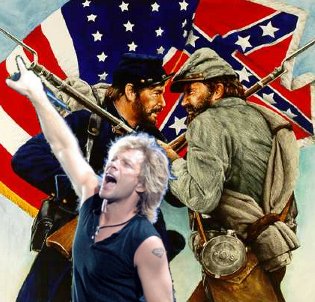The Battle Hymn of New Jersey, Fenzel
 In the discussion leading up to this post, Belinkie posed us a question:
In the discussion leading up to this post, Belinkie posed us a question:
“How do you reconcile this two statements?
‘We got each other.’
‘You live for the fight when that’s all that you got.'”
I took the challenge. Two possible interpretations:
Since it doesn’t make a difference if we make it or not, but everything is for love, for love, then the song praises the real-time experience of being in a relationship strained by poor finances, not the value of the relationship despite the struggle.
That was a mouthful, so let me clarify: It is a good thing that Tommy and Gina are facing adversity as a couple. It is not a good thing in itself that Tommy and Gina face adversity. It is not a good thing in itself that Tommy and Gina are a couple.
Therefore, the value derived from having nothing but a fight and nothing but a girlfriend are the same thing. Each is referential to the other. We are coming at this relationship from the possibly unsavory standpoint that, in this world, the things about relationships that are not hardships either don’t exist or don’t matter. Furthermore, the value of hardship and perseverance are not realized outside the purpose of a relationship.
Or
“We’ve got each other,” is said by Tommy and Gina, but “You live for the fight when it’s all that you‘ve got” is said by Bon Jovi himself. For several reasons, not the least of which being the considerable stress under which Tommy and Gina live, Bon Jovi is the more reliable narrator. The contradiction is Bon Jovi’s way of cluing us in to what is really going on, because Tommy and Gina are lying to each other and to us.
Gina first says “We’ve got each other” to herself and to Tommy as a way of justifying and encouraging herself to keep supporting Tommy financially. It is later said by Tommy to try to prevent Gina from leaving him and to stop her from crying in the night, because “Gina dreams of running away.”
This is a relationship that is on the brink of collapse that has very little intrinsic reason to exist. Tommy and Gina seek to justify it by narrativizing it. They are looking for reasons to stay together, and with the risk of their imminent separation, it’s probable that they do not, in fact, “got each other.” The assurance is offered as an empty platitude in service to what they actually have: namely, the fight.
Bon Jovi is telling us on the sly that it is in service to “the fight” that Tommy and Gina stay together, not in service to each other or to their relationship.
Synthesis
Livin’ on a Prayer is a battle hymn for the war of the heart. By coming up short of finding salvation or romance or of justifying struggle for its own sake, it does what all great war songs do — it finds the neccessary combination of the use of force with the purpose for battle. It finds why fighting is what we must do as opposed to other things, why we must fight in this interest instead of others, and why the two necessities are consistent and dependent on one another.
Of course, it is a metaphorical fight, but with these songs, much of the fight is always metaphorical. Battle hymns cheer on workers or support staff as much as soldiers, and soldiers who are transporting materiel or offering logistical support as much as those who are in battle. Battle hymns are about consensus.
And what two things do people in New Jersey have greater consensus on than the difficulty of personal finance and the difficulty of personal relationships? Jersey born and Jersey bred (and when I die, I’ll be Jersey dead), I can think of none.
It makes everybody in the bar so hyped up and happy/angry because it unites us all against the common foes of our people.
That battle hymn is the Prayer on which my people are Livin’. It sure ain’t a paternoster.

![Perspectives on Bon Jovi's "Livin' on a Prayer" [Think Tank]](https://www.overthinkingit.com/wp-content/uploads/2009/07/bonjovithinktank.jpg)
Does anyone know what the lines “Tommy got his six string in hock. Now he’s holding in what he used to make it talk” actually mean? I assume “six string” means guitar, but what is a “hock” and how is he “holding in what he used to make it talk”?
I’ve always understood it to mean that Tommy pawned his guitar and is holding in his musical soul, which is what he used to play it. Like musical blue balls. Sad stuff, Mr. Jovi. Sad stuff.
Exactly — in hock means in the pawnshop.
http://www.urbandictionary.com/define.php?term=hock
Think of how different the song’s meaning would be if the lyric was, “Tommy got,” not, “Tommy’s got.” When you look it up, the false version appears quite frequently online, but listening to the recording, he clearly sings the “s.”
think he is mainly tellling a story
holding on to a prayer to survive
it is also a song wi hope
with a sad story at the back ground
she says gina says
we got to hold on
it is in a context
What a bunch of bullshit.
What’s bullshit about it?